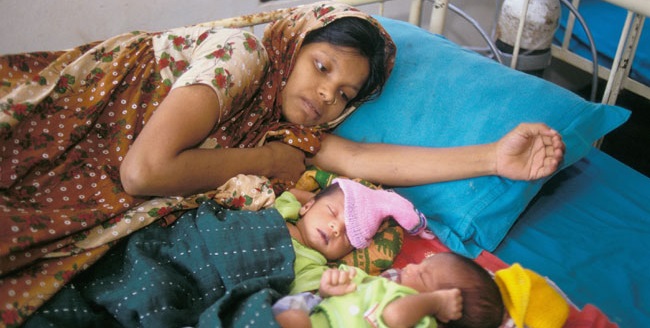
From May 28-30th, Prime Minister Stephen Harper hosted a global summit on maternal, new-born and child health (MNCH). Entitled Saving Every Woman, Every Child: Within Arm’s Reach, the summit addressed the frequency of preventable deaths among women and children in the developing world. Delegates sought to reaffirm their commitment to the Muskoka Initiative, an agreement born out of the 2010 G8 summit. Members and non-members of the G8 originally pledged five billion dollars towards advancing the fourth and fifth Millennium Development Goals (MDG), with Canada adding 1.1 billion dollars to an existing 1.75 billion dollar fund. Prime Minister Harper began last month’s summit with a stirring announcement – Canada will increase its funding towards global MNCH to 3.5 billion dollars over the next five years.
Canada stands in the vanguard in improving global MNCH. The Prime Minister has been directly involved in the United Nations Commission on Information and Accountability for Women’s and Children’s Health and the United Nations Global Strategy for Women’s and Children’s Heath, while the government funds both national and foreign development organizations.
International collaboration among states and stakeholders has dramatically improved MNCH in the global south. The World Health Organization reports that maternal mortality rates have steadily declined since the launch of the Initiative. As the global maternal death rate has nearly halved since 1990, reaching the fifth MDG goal remains viable. Meanwhile, development organizations have been vocal about the marked benefits of Muskoka. Plan Canada mentioned the “remarkable preliminary results” of its funded MNCH projects including the ability to reach more patients and train more health workers.
Having distributed eighty percent of its original 2.8 billion dollar pledge, Canada’s renewed MNCH funding will be critical to maintaining existing programs. Prime Minister Harper stated that “[t]his new phase from 2015-2020 will focus on the best programming, innovation and partnerships from the past four years and it will be given increased financial resources.” Specifically, it will target vaccination programs, nutritional improvement and strengthening local health systems.

Citizen advocacy may have played a role in harnessing global commitment to MNCH. Individuals and development organizations undertook an online advocacy campaign ahead of the international conference. Partners of Every Woman, Every Child launched the twitter hashtag #commit2deliver to raise public awareness and pressure signatories of the Initiative to advance MNCH development and delivery. Since April, there have been hundreds who have tweeted the hashtag.
The Canadian branches of UNICEF, Care, Save the Children and World Vision joined the social media campaign while focusing on the country’s leadership role. Organizations and individual advocates employed the #commit2deliver hashtag with #CanadaCares, imploring the Harper government to uphold its responsibilities. Many specifically advocated for increased spending. For instance, RESULTS Canada launched a call to action proposing Canada advance the next phase of MNCH funding to a minimum 3.25 billion dollars. Volunteers of the organization submitted over one thousand letters to newspapers urging Canada to increase its pledge, many of which were published. Indeed, RESULTS had been one of many NGOs proposing a 3.25 billion dollar investment.
Attention on global MNCH development continues this month as the U.S. Agency for International Development (USAID), together with UNICEF and the Bill and Melinda Gates Foundation, will hold another forum on preventable child and maternal death.
Whether or not citizen advocacy played a role in Canada’s 3.5 billion dollar pledge, public engagement in national policy will only encourage long-term social and political development.




